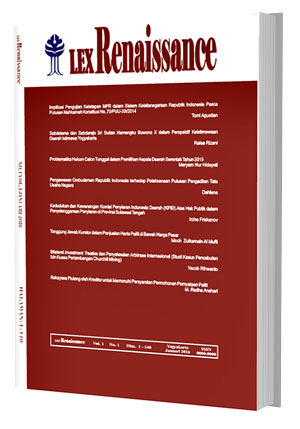Main Article Content
Abstract
This study aims to analyze the legal politics of Law Number 23 of 2019 on Management of National Resources for National Defense. The legal issues presented in this study are the political direction of Law Number 23 of 2019 on the Management of National Resources for National Defense and its implications for the people. This is a normative legal research, which the results conclude that the birth of the a quo Law is motivated by a situation to strengthen the national defense in the face of threats through the universal people's defense system. The legal political direction of the a quo Law is to realize the upholding of state sovereignty, maintaining territorial integrity, and the safety of the entire nation from all forms of threats. In addition, a number of principles listed as the basis in the a quo Law are quite manifest in several articles. However, these principles are then reduced by the tendency of the material content of the a quo Law which has the nuances of violating human rights, overcriminalization, being less accommodating to current threat conditions, as well as creating the potential for misuse in its funding.
Keywords
Article Details
Authors who publish with this journal agree to the following terms:
a. Authors retain copyright and grant the journal right of first publication with the work simultaneously licensed under a Creative Commons Attribution License that allows others to share the work with an acknowledgement of the work's authorship and initial publication in this journal.
b. Authors are able to enter into separate, additional contractual arrangements for the non-exclusive distribution of the journal's published version of the work (e.g., post it to an institutional repository or publish it in a book), with an acknowledgement of its initial publication in this journal.
c. Authors are permitted and encouraged to post their work online (e.g., in institutional repositories or on their website) prior to and during the submission process, as it can lead to productive exchanges, as well as earlier and greater citation of published work (See The Effect of Open Access).References
- Buku
- Ali, Zainuddin, Metode Penelitian Hukum, Cetakan Kelima, Sinar Grafika, Jakarta, 2014.
- Irianto, Sulistyowati dan Shidarta, Metode Penelitian Hukum: Konstelasi dan Refleksi, Cetakan Pertama, Yayasan Obor Indonesia, Jakarta, 2009.
- Kusnardi, Moh dan Bintan R. Saragih, Ilmu Negara, Cetakan Kelima, Gaya Media Pratama, Jakarta, 2005.
- Mahfud MD, Moh, Politik Hukum di Indoensia, Cetakan Ketujuh, Rajawali Pers, Jakarta, 2017.
- Muladi, Kapita Selekta Hukum Pidana, Badan Penerbit Universitas Diponegoro, Semarang, 1995.
- Sungguno, Bambang, Metode Penelitian Hukum, Raja Grafindo Persada, Jakarta, 2003.
- Jurnal
- Gumanti, Retna, “Reconceptualizing Consumer Contracts in the Philosophical Perspective of Pancasila”, 1 (1) Prophetic Law Review 37, 2019.
- Heriyanto, D. S. N., “Legal Challenges to Improve and Reform the Privatized Water Services in Indonesia”, 1 (1) Public Goods & Governance 11, 2016.
- Mardhani, Dewie, et.al., “Keamanan dan Pertahanan Dalam Studi Ketahanan Nasional Guna Mewujudkan Sistem Keamanan Nasional”, Jurnal Pertahanan & Bela Negara, Vol. 10 No. 3, Desember 2020.
- Maujana Saragih, Hendra, “Diplomasi Pertahanan Indonesia Dalam Konflik Laut China Selatan”, Jurnal Ilmu Politik dan Komunikasi, Vol. 7 No. 1, Juni 2018.
- Internet
- “Risalah Rapat Komisi I DPR RI pada Rabu 21 Agustus 2019”, http://www.dpr.go.id/uu/detail/id/44, diakses pada tanggal 20 Maret 2021.
- “Naskah Akademik Rancangan Undang-Undang tentang Pengelolaan Sumber Daya Nasional untuk Pertahanan Negara”, https://www.bphn.go.id/data/document/na ruu tentang pengelolaan sumber daya nasional untuk pertahanan negara.pdf, diakses pada 23 Maret 2021.
- Peraturan Perundang-Undangan
- Undang-Undang Dasar Negara Republik Indonesia Tahun 1945.
- Undang-Undang Nomor 23 Tahun 2019 tentang Pengelolaan Sumber Daya Nasional untuk Pertahanan Negara. Tambahan Lembaran Negara RI Nomor 6413.
References
Buku
Ali, Zainuddin, Metode Penelitian Hukum, Cetakan Kelima, Sinar Grafika, Jakarta, 2014.
Irianto, Sulistyowati dan Shidarta, Metode Penelitian Hukum: Konstelasi dan Refleksi, Cetakan Pertama, Yayasan Obor Indonesia, Jakarta, 2009.
Kusnardi, Moh dan Bintan R. Saragih, Ilmu Negara, Cetakan Kelima, Gaya Media Pratama, Jakarta, 2005.
Mahfud MD, Moh, Politik Hukum di Indoensia, Cetakan Ketujuh, Rajawali Pers, Jakarta, 2017.
Muladi, Kapita Selekta Hukum Pidana, Badan Penerbit Universitas Diponegoro, Semarang, 1995.
Sungguno, Bambang, Metode Penelitian Hukum, Raja Grafindo Persada, Jakarta, 2003.
Jurnal
Gumanti, Retna, “Reconceptualizing Consumer Contracts in the Philosophical Perspective of Pancasila”, 1 (1) Prophetic Law Review 37, 2019.
Heriyanto, D. S. N., “Legal Challenges to Improve and Reform the Privatized Water Services in Indonesia”, 1 (1) Public Goods & Governance 11, 2016.
Mardhani, Dewie, et.al., “Keamanan dan Pertahanan Dalam Studi Ketahanan Nasional Guna Mewujudkan Sistem Keamanan Nasional”, Jurnal Pertahanan & Bela Negara, Vol. 10 No. 3, Desember 2020.
Maujana Saragih, Hendra, “Diplomasi Pertahanan Indonesia Dalam Konflik Laut China Selatan”, Jurnal Ilmu Politik dan Komunikasi, Vol. 7 No. 1, Juni 2018.
Internet
“Risalah Rapat Komisi I DPR RI pada Rabu 21 Agustus 2019”, http://www.dpr.go.id/uu/detail/id/44, diakses pada tanggal 20 Maret 2021.
“Naskah Akademik Rancangan Undang-Undang tentang Pengelolaan Sumber Daya Nasional untuk Pertahanan Negara”, https://www.bphn.go.id/data/document/na ruu tentang pengelolaan sumber daya nasional untuk pertahanan negara.pdf, diakses pada 23 Maret 2021.
Peraturan Perundang-Undangan
Undang-Undang Dasar Negara Republik Indonesia Tahun 1945.
Undang-Undang Nomor 23 Tahun 2019 tentang Pengelolaan Sumber Daya Nasional untuk Pertahanan Negara. Tambahan Lembaran Negara RI Nomor 6413.




